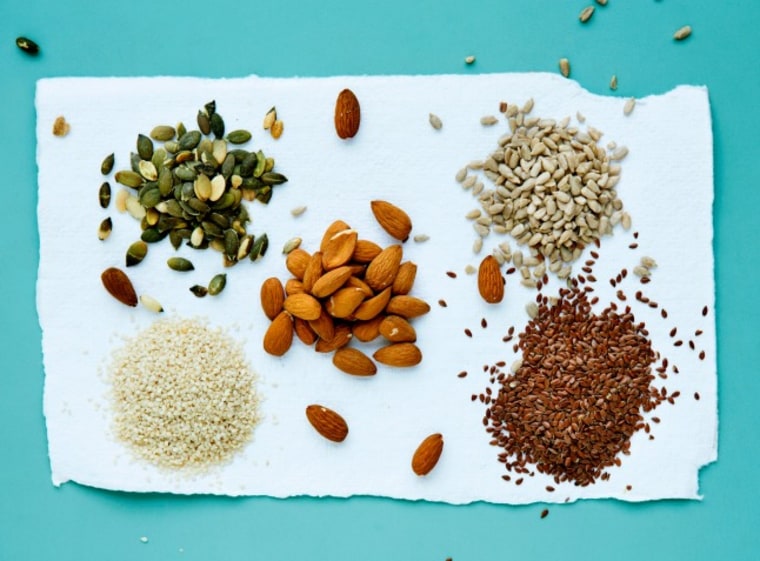Seeds are ultra-healthy and can be incorporated into our diets in so many ways. Like nuts, seeds are rich in protein, healthy fats, and fiber, as well as vitamins, minerals, and antioxidants. And some seeds—like chia seeds and flaxseed—have received extra attention for their high omega-3 fatty acid content. Though seeds aren’t necessarily healthier than nuts, they’re easier to add to foods like baked goods, pancakes, oatmeal, soups, and salads...pretty much anything!
Sesame seeds
Traditionally used in Asian cuisines, they add a nutty taste and crunchy texture to salads, chicken and sushi. But you can add sesame seeds to just about anything: baked goods, cereal, yogurt or fish. One tablespoon provides 52 calories, 2 grams of protein, 1 gram of fiber and 4 grams of fat. They’re high in calcium, magnesium (good for vascular and respiratory health) and copper, which has a positive impact on the immune system. Sesame seeds increase your levels of Vitamin E, which plays a vital role in fighting disease. Recent research has found that sesame seeds may play a role in reducing the risk of conditions like multiple sclerosis and Huntington’s Disease and produce an antidepressant-like effect.
Sunflower seeds
Their mild taste and tender texture make them an excellent snack on their own, but they're also great as an addition to salads, soups, breads, or sprinkled over meats, poultry or fish. Sunflower seed butter is also a popular alternative for those with peanut allergies. Sunflower seeds are an excellent source of vitamin E—they contain more per serving than any other food—which boosts heart and skin health. They’re also high in magnesium, for more energy and stronger bones health, as well as selenium, a trace mineral that increases HDL (the good cholesterol) for a healthy heart. A one-tablespoon serving of raw sunflower seeds (without their shell) contains 51 calories, 2 grams of protein, 1 gram of fiber, and 4.5 grams of fats, most of which are monounsaturated and polyunsaturated.
Flaxseed
Ground flaxseed has a mild, nutty taste that is similar to wheat germ, but whole flaxseeds are relatively tasteless. One tablespoon of whole flaxseed serves up 55 calories, 1.88 grams of protein, 2.8 grams of fiber and 2.1 grams of alpha linolenic acid (ALA), a plant-based omega-3 fatty acid. These nutrients contribute to digestive and cardiovascular health and exert anti-inflammatory activity in the body to combat free radicals. Ground flaxseed is easier for the body to digest and absorb and can be easily added to baked goods like pancakes or over yogurt, oatmeal and cereal.
Chia seeds
Like flaxseed, chia seeds are a good source of omega-3 fatty acids for vegetarians, with around 2 grams of ALA per tablespoon. They’re also packed with 2.5 grams of protein and 5 grams of fiber. A study from the University of Toronto found that individuals who ate 3 tablespoons of chia seeds daily experienced less spikes in their blood sugar—reducing risk of metabolic syndrome and diabetes—as well as lower blood pressure and in total inflammation. They also boost satiety—chia seeds can absorb up to 12 times their weight in water, so once in your stomach they make you feel fuller and less prone to overeating. You can add virtually tasteless chia seeds to oatmeal, smoothies, cereal, yogurt or baked goods.
Pumpkin seeds
One tablespoon of pumpkin seeds has 57 calories, 2.7 grams of protein, 0.3 grams of fiber and 4.7 grams of healthy monounsaturated fats, which have been found to help lower LDL cholesterol (the bad stuff) and raise HDL cholesterol (the good stuff). Pumpkin seeds are a good source of the antioxidant vitamin E, immune-boosting zinc and manganese, as well as a diverse group of other antioxidants that aren't commonly found in other foods. Recent research has suggested that pumpkin seeds may play a role in insulin regulation and diabetes management. Sprinkle pumpkin seeds in soups, salads and stir-fries, or snack on them as you would nuts.
A version of this story originally appeared on iVillage.
